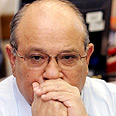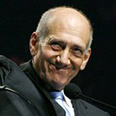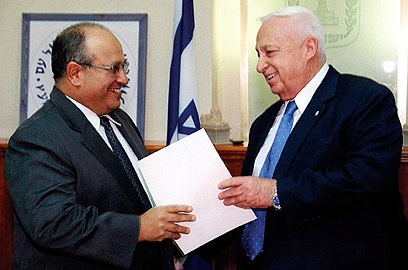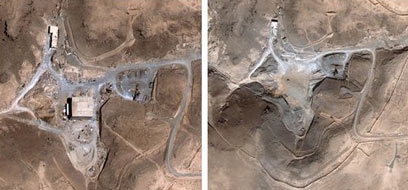

Man on a mission
Mossad Chief Meir Dagan took a dreary, weary organization and turned it back into every bad guy's worst nightmare, while positioning himself as one of the intelligence community's strongest players in the process. He just has one pesky little thing to deal with before he retires – Iran
Mossad Chief Meir Dagan has been able to do what many considered the impossible – restore the Mossad's epic reputation and reposition it in the hub of what can only be described as Israel's complex intelligence community. Dagan's Mossad is a force to be reckoned with.
That, of course, wasn't always the case. When Dagan was named Mossad chief in 2002, he found a tired, anemic organization that did little to justify the vast financial resources funneled its way.
Soon after being named Mossad chief, Dagan made it clear he was there to shake things up. He did not overtly set out to "clean house," but presented his officers with enough challenges for the house to clean itself up. The rest, he said, could only be achieved if the Mossad provided specific results. If you believe foreign publications, that's exactly what it has been doing.
Dagan will not be leaving the Mossad in the foreseeable future. His innate position as one of the top figures in Israel's intelligence community will make his contribution indispensable when the time comes to make any decision regarding Iran. Much of Israel's future – or for the very least the quality of that future – lies with him; not bad for someone whose career in the defense establishment seemed over just a few short years ago.
Dagan left the IDF a Brigadier General and deputy-chief of the Military Operations Branch. During his 32 years of service he was wounded in combat twice and received one medal of valor. He left the IDF after being passed for a spatial command. Dagan's return to the defense community ranks was devised by former Prime Minister Ariel Sharon: The two had a long, successful history of working together, and some say Sharon saw Dagan as a younger version of himself.

Parallel version. Dagan with Ariel Sharon (Archive photo: Reuters)
The spy who came in from the cold
When Dagan left the IDF he did what every newly-sprung soldier does – he packed a bag and went on a tour of Asia. He was still searching when he came back, dabbling in various independent ventures; but he soon found himself out of place in the Israeli corporate world. So, he ended up navigating himself back to the world he knew best, a world clearly divided into black and white, good guys and bad guys; or in other words – Jews and Arabs.
Dagan joined the Counter-Terrorism Bureau, the same one that keeps issuing travel advisories on Sinai, and there he stayed until Sharon pulled him out – to run to Likud's election headquarters first, but from there, the road to heading the Mossad suddenly seemed shorter.
Dagan's nomination did not go over smoothly. Many of Sharon's ministers said it was inappropriate for a man which such a clear political affiliation to hold such a sensitive position; but Sharon wouldn't budge. "They'll be eating their words soon enough," he told a staff member. He was right.
Much of the secret to Dagan's success in the Mossad lies with the fact that the organization was at one of its lowest points when he took over: The botched assassination attempt of Hamas politburo chief Khaled Mashaal in Jordan and the arrest of several Mossad officers in Switzerland turned the bureau from a roaring lion to a sleepy pussycat.
When Efraim Halevy took over as Mossad chief from Danny Yatom in 1998, he seemed the perfect man for the job – reliable and discreet, a Mossad-grown leader who knows the organization from the inside out. But Halevy was perceived as a paper-pusher. The ultimate paper-pusher, but still – just that. He was very much the diplomat, often choosing words over actions. The mirror image of Dagan, if you will.
Sharon believed Dagan was the man to bring the Mossad back to its glory days; and the latter believed actions speak louder than words. In order for his plans for the Mossad to materialize he needed three things: Men, guts and backing. He never lacked guts and Sharon provided him with all the backup he needed. The challenge was finding the right men for the job.
First among the unequal
Dagan knew he needed a strong wingman, someone who knows the Mossad well; but he feared a strong deputy may try to undermine him. The solution: He chose two deputies instead of one. The first, T., would head all the operational divisions, and the second, H., will head the recruitment and training divisions. The idea was copied from the Israeli Air Force, but what worked for the IAF proved unsuccessful for the Mossad. Dagan's divide-and-conquer methods resulted in T. and H. constantly butting heads; H. ended up leaving, T. then left and later returned as Dagan's sole deputy.Dagan then began making other changes: Understanding that he needed to create high-level synergy between his intelligence and operational branches, in order to break free from the dependence on IDF Intelligence and achieve the results he craved; he wanted to boost his intelligence gathering capabilities. A., a former IDF Intelligence brigadier- general, with four successful Mossad years to his name, was named head of the new intelligence division and in a relatively short amount of time, Dagan had an Intelligence gathering operation of his own, which was able to successfully rival his military counterparts.
Dagan went on to bring an array of outside advisors to boost the Mossad's strategic capabilities. He also brought one his confidants to head the organization's human resources department and other key positions within Mossad ranks. The result was that he had to face minimal internal intrigues. For better and for worse, Dagan's Mossad is very much a one-man show.
Return of the long arm
When Dagan took over the Mossad he had little room for optimism. First there was Mossad failure to detect Libya's progress on non-conventional weapons. MI6 and the US found out about it first and reportedly deliberately kept it from their Mossad contacts, fearing their loose lips may hinder the efforts to have Libya agree to disarm – which it eventually did.
Then came the unfortunate demise of several senior Hizbullah militants in Lebanon. The Lebanese media's knee-jerk reaction was to finger Mossad as the culprit – and Dagan would have been happy to take the credit – but it wasn't his men that carried out the mission. Nevertheless, the mystery enveloping that incident did wonders for the Mossad's daunting image as an organization which operates in the shadows, one you can never be sure just what it does and doesn't do.

Under wraps. The Syrian plan site (Archive photo: AP)
According to US publications, however the Mossad's return as a full-fledged member of the intelligence community has an exact time stamp: September 6, 2007 – the day Syria told the world Israeli fighter jets flew in and destroyed a covert nuclear facility under construction on Syrian soil.
From the information available through foreign publications, the Syrian nuclear endeavor began back in 2001. It spent six years – a virtual eternity by Israeli, American and British intelligence communities' standers – under wraps; especially where such a critical Middle East player is involved. No one knows exactly how the Syrians kept their activaties from being detected for so long, but according to the American press, the Mossad picked up on it in March 2007, beginning the process which ended with the September strike.
.
The Syrian drama continued on February 12, 2008, when arch-terrorist Imad Mugniyah had a somewhat rough encounter with an explosive device. Both the Arab and the international media credited the Mossad for Mugniyah's assassination; and the evident panic felt by Hizbullah – as evident in Hizbullah Chief Sheikh Hassan Nasrallah's frantic speeches – made one point abundantly clear: Israel's enemies were once again dreading the long arm of the Mossad.
Both Syrian and Hizbullah have launched inquiries into Mugniyah's assassination, trying to understand how – and who – was able to breach the tight security around the man who spent the last 20 years being the Middle East's most wanted terrorist, and always managed to stay one step ahead. The investigations, however, had less to do with finding out what really happened and more to do with anxiety: If, as claimed by foreign publications, the Mossad really was behind Mugniyah's assassination – if the Mossad was able to get to him – it could get to anyone.
That panic was exactly what Dagan was going for. Yes, Hizbullah might retaliate, but the one act of revenge could not take away from the fear drilled into Nasrallah's mind – the same fear that has kept him in hiding for the past 18 months. No place is safe, not even Damascus. The Mossad will decide if you live or die.
Both Nasrallah and Syrian President Bashar Assad are still looking for the person who tipped the Israelis off. Dagan believes that is exactly where Syria belongs – on the edge, ostracized. He does not believe Assad wants peace. He is sure it is nothing but a cheap ploy aimed at making Israel agree to painful concessions, which would render it weak, before he clobbers it.
Dagan has been persistent in his objections to holding any kind of peace talks with Syria – before and after the September strike. You have to wheel some substantial influence in order to be the right-wing marker on the Syrian issue, and hold the exact opposite opinion to that of the IDF chief of staff and the head of military intelligence. Dagan does.
Know your prime minister
So how is it that Dagan is virtually the only one opposed to any dialogue with the Syrians? His opponents claim he just continues seeing the Arabs as the perpetual enemy and cannot adapt to an ever-changing reality. His supporters claim that he is just one of the few willing to stare reality in the eye, rather than manufacture a false one. That image stuck with Dagan during the Second Lebanon War: He sat in many of the cabinet meetings during the war, and when you look back at the things he said, you see he had a clear, realistic view of the security situation back in 2006. In many cases, his views were a lot clearer than the ones held by those running the show.
As soon as the war broke out, the day Eldad Regev and Ehud Goldwasser were taken captive by Hizbullah, Dagan said that any scenario entailing a harsh response would not be able to include a one-time military strike. He immediately said any retaliation would mean an all-out war, that the air force will no be able to tackle the mission by itself and that the IDF had to mobilize its reserves. He was all for a massive ground incursion; and towards the end of the war, was the first to realize Israel wasn't doing that well, and that a massive military maneuver was required if we wanted to have something to show for all that fighting.
Prime Minister Ehud Olmert refused to listen to Dagan and has lived to regret it. Prior and during the Second Lebanon War, Olmert closest confidant was Shin Bet Chief Yuval Diskin. By the end of the war, Dagan had the PM's ear; and once the war was over, both Dagan and Diskin demanded Olmert launch a comprehensive inquiry into the war. They never explicitly said that then-IDF Chief of Staff Dan Halutz be ousted; but they sent the clear message that postponing the war probe would mean alienating them both. To this day, Olmert is still convinced Diskin was the one who leaked the story to the media. Perhaps this would be the place to tell him he's wrong.
The past year has seen Dagan and Olmert get closer. Right now, Olmert knows he has only two ways to pull himself out of the mess his has been in since the war ended – a significant diplomatic move or a significant military one. The former's chances seem slim – the Palestinian avenue will take years and the Syrian one is hardly a safe bet, regardless of Dagan's opinion. On the other hand, Olmert had already been burnt by a wide-scale military operation and is anything but eager to launch one in Gaza. That's where Dagan comes in.

Next on the list? The nuclear plant at Bushehr (Photo: AP)
If the international press was correct, then Dagan has provided Olmert with two major coups – destroying Syria's nuclear plant and eradicating Imad Mugniyah. Either way, Olmert announced recently that Dagan's tenure as Mossad chief was to be extended by one year. Another extension is more the likely, making Dagan's seven years as Mossad chief one of the longest tenures the organization has seen. That's exactly the problem.
Many in intelligence community are concerned. Dagan's long tenure as chief, his dominance, the challenges ahead – all mean Dagan has turned into much more than a key player. Anyone looking for proof can find it in the simple fact that today – five and a half years into his tenure – there is no replacement in sight.
Dagan has been unable to cultivate a real number-two man. H. left. T. hanged in there for two years and was then replaced by N. T. was lent to the IDF – as both he and N. assumed Dagan would retire in 2007 – but he didn’t. The musical chairs continued as N. left and T. was called back to the Mossad, back to the deputy's position. A year has gone by and Dagan is nowhere near retirement – he's gearing up for his seventh and eighth year in office.
First, we take Bushehr
Olmert's decision has a lot to do with the fact that Dagan is the one running the show when it comes to the Iranian threat. His future actions, or failures, will go a long way to determine if Israel can undermine Iran's nuclear ambitions.
Right now, Dagan supports diplomatic efforts coinciding with accelerated operational readiness. As time goes by, he is supposed to devise the plan which will take Israel from diplomatic action to military one. In layman's terms, Dagan is the one who is supposed to find out all the important things: Whether or not Iran is working on a "dirty" bomb, does it have new uranium enrichment plants, when will it arrive at the point of no return; and what can Israel do about it, besides what has already been done, before the military options becomes the only one. Dagan does not have the answers to any of those questions yet. It's hard to imagine he will leave the Mossad before he does. This, he knows, is the mission of a lifetime.
Dagan has a militant view of reality, especially the one pertaining to the Arab world. If and when the need arises he will push for an attack on Iran full speed ahead. Since Dagan is known for getting what he wants, we all have to wait and see what he comes up with. If he succeeds in his Iranian project we will all be indebted to him forever. If he fails, we will all be remembered as one of history's failed experiments.
- Stay focused















